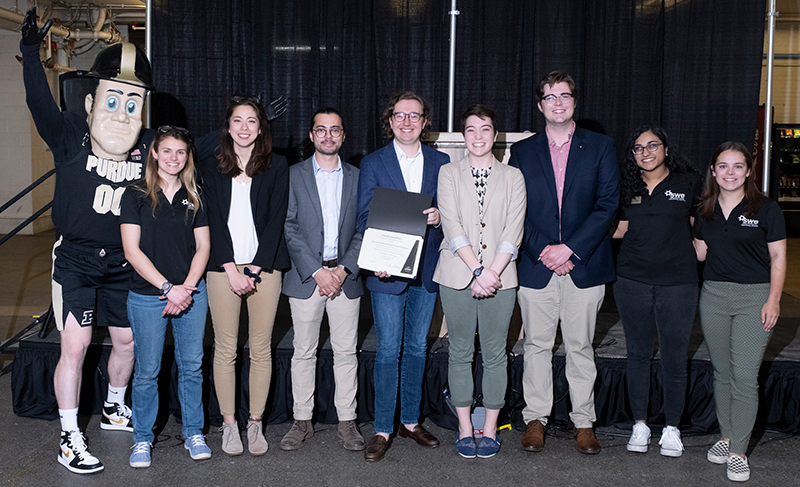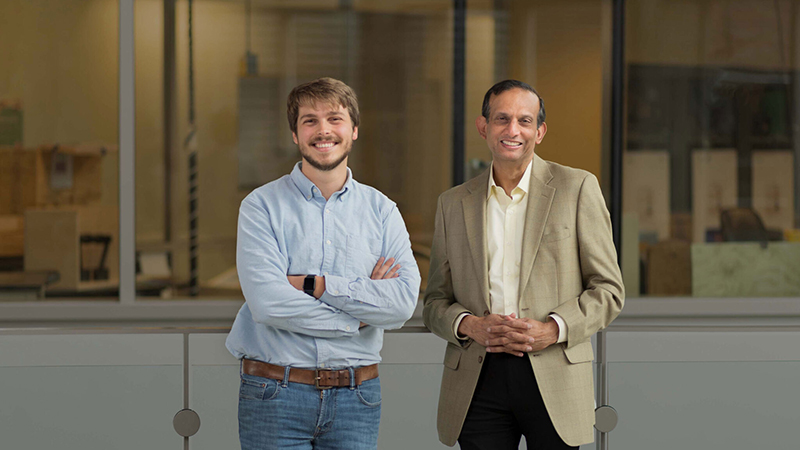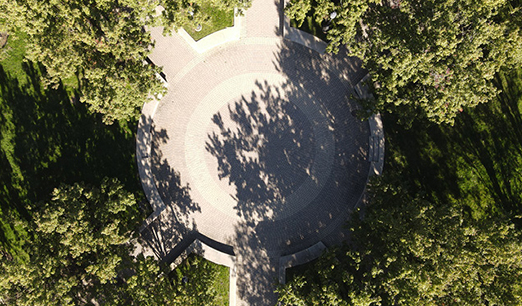Multidisciplinary Engineering

Featured Photo: This MDE Senior Capstone Design Team won the 2022 Purdue SWE Catalyst for Change Award at the inaugural College of Engineering Design Expo. Their "squeezy hand" design is a soft robotics project that imitates the feeling of holding a hand. It is designed to address common sensory overload associated with autism spectrum disorders.
Explore Multidisciplinary Engineering
Multidisciplinary Engineering is designed for students who want to practice engineering around a focused concentration by combining or involving several academic disciplines. Develop your own individual plan of study or select one of the established plans of study.
Multidisciplinary Engineering Concentrations
Acoustical Engineering
Acoustical engineers are problem solvers and opportunity makers involving sound in the natural or made world. Their focus may be concerned with limiting unwanted sound (noise) or improving and enhancing sound quality. Students interested in acoustical engineering are sometimes musicians, or have an interest in how sound impacts the environment around us.
Engineers from this concentration may work in industries such as: construction, defense, automotive, entertainment, technology, health and ecological or biological sciences.
Their work may include: designing acoustically efficient settings (music halls to the inside of a car) to designing ear buds, head phones, microphones, and hearing aids. They may be involved in consulting, or even work in the military or military contracting using acoustics to support our armed forces and naval defense systems.
Educational Engineering
Educational engineering combines the skill and capabilities of engineering theory and practice with an education theory and practice background. This insight into what it means to “know engineering”, can be put to beneficial work in the domain of education, or educational endeavors. Note: This concentration does not qualify for teacher certification.
Engineers from this concentration may work in sectors such as: public/private museums – in particular those focused on STEM outreach, private education networks, not-for-profit education outreach programs, testing and tutoring firms, and education based companies focused on developing and supporting learning, educational materials, and curricular content in engineering.
Their work may include: development of age appropriate engineering education materials, resources, activities, and teaching/learning artifacts; support of content management systems and educational operations activities; assessment development, tutoring and proctoring. Students may most likely desire to pursue higher education.
Engineering Management
Engineering management is for those who see how the world of technology and innovation connect with business enterprise, and the leadership of people and projects. Building on theoretical and practical engineering applications, engineering management aims to incorporate data analytics, personnel management, project management, entrepreneurship and ultimately prepare problem solvers who are also team builders and strategic resource managers.
Engineers from this concentration may work in any industry: from healthcare, construction, to retail, technology, financial and energy sectors, consumer products and so many more.
Their work may include: leading operations in manufacturing management to developing and defining optimized logistics supply chains. Their skills are also valued in technical consulting, particularly in areas of operations improvement, continuous improvement, and quality.
Explore Engineering Management
In the News | From engineer to fashion designer, Danielle Render, '17 MDE Engineering Management and Outstanding Service Award recipient
General Engineering
General engineering graduates contribute to a firm’s overall engineering personnel by having a broad based engineering education. This engineering mindset, combined with solid engineering skill set allows for maximum flexibility in placement into nearly any firm or industry, across a broad range of potential roles, including but not limited to: production engineering, technical sales, continuous improvement engineering, operations management, manufacturing engineering, tooling engineering, process engineering, supply chain, etc. Students take courses in engineering, and augment their skills with coursework ranging from CAD, product life cycle management, six- sigma, technical sales, project management or other areas of interest to their desired career.
Students from this concentration may work in a wide range of industries, and range of company sizes.
The work of general engineers may include improving production or operations including those involving production machinery, production processes, or work flows. It might also include looking for ways to improve quality or cost effectiveness, speed to market, or the purchase or sales of raw materials or finished goods or services for a firm. The career opportunities of this role are open ranging, aided by the technical and social skills developed while in the program, and networking achieved through internships and career fairs.
Humanitarian Engineering
Humanitarian engineers focus the skill and capabilities of engineering theory and practice toward aiding the greater good of humanity by offering stakeholder centric solutions to medical and disaster relief, global outreach, human displacement, human safety, food security, cultural awareness/sensitivity, and economic development.
Engineers from this concentration may work in industries such as: the not for profit sector, faith-based charities, NGO’s (i.e. global aid/global health), international development, as well as state, federal and international government agencies.
Their work may include: leading research and data analysis in problem topics to develop novel approaches to reduce risk and improve outcomes, to developing and designing improved water and sanitation systems, .to project and supply chain management around aid distribution, supply route repair. The focus of work will always engage a range of stakeholders with many competing interests ranging from time to monetary, religious, geopolitical, raw material and sustainability constraints.
In the News | Senior Highlight with Ashley Foltz, '21 MDE Humanitarian Engineering
Lighting Engineering
Lighting engineering is concerned about the esthetics, efficiency, and quality of light and lighting products in our built world. Lighting engineers deploy skills of product design, electrical engineering, civil engineering, and mechanical engineering to generate innovative product and lighting layout designs to improve user quality of life and safety. Deeply technical in focus, lighting engineers must work well both independently and collaboratively to harness new materials and innovate novel and pleasing applications in lighting. Including connecting to the IoT.
Engineers from this concentration may work in industries such as: consumer products and related technologies, interior/architectural design, retail, entertainment/theatre and construction.
Their work may include: developing more cost effective lighting fixtures, poles, and physical applications (healthcare, landscape, roadway) to developing novel personal lighting, to designing for new light sources such as LED. Lighting consultants help construction and architectural firms apply lighting in artistic, esthetic ways, as well as energy efficient, unobtrusive, and even ways that improve personal safety. Smart lighting designs also connect to the IoT, to improve product quality and expand user needs and options.
Nano Engineering
Nano engineering is the application of engineering principles and functional systems at the nano/atomic scale. It combines the worlds of physics, material science and even cellular level biosciences. Nano engineers work to innovate smaller more efficient products, machines, or medicines to solve some of the world’s largest problems including genetics, sanitation, and power generation. Roles may range from Junior scientist to Materials, bioscience, or software engineer.
Engineers from this concentration may work in industries such as: pharmaceutical, medical device, consumer products, textiles, electronics, transportation/automotive, and defense.
Their work may include: developing next generation power storage (batteries), to developing nanoscale processing techniques in electronic manufacturing, to innovating novel laboratory testing and measuring devices. Nanotechnology engineers frequently model nanoscale systems, to improve efficiency, quality, or efficacy. These improvements could involve pharmaceutical delivery, health devices, security/defense systems, and or manufacturing.
Theatre Engineering
Theatre engineering is the application of engineering principles and functional systems in the design and development of safe, creative, and functional sets, apparatus, and entertainment production devices. It combines disciplines of civil, mechanical and electrical engineering, and spans the boundary between the humanities (art), computer science and the field of entertainment arts.
Engineers from this concentration may work in industries such as: performing arts, theatre, film/video production, and amusement parks.
Their work may include: developing artistic and innovative set designs or devices for live entertainment, to building the next generation amusement park ride environment. Film set creation and animation is also a familiar pathway for these creative engineers looking to network their way toward a career that combines their passion for creating entertainment experiences and engineering problem solving.
In the News

When Rich Dionne, associate professor of practice in theatre, saw the incredible need for theatre engineering education, he joined Mary Pilotte, associate professor of engineering practice, to create Fusion Studio for Entertainment and Engineering, a hub dedicated to sharing ideas and building connections in the live entertainment engineering industry.
As the only school in the country offering a theatre engineering degree, Purdue is uniquely positioned to fill the need for education surrounding the rapidly advancing technology in TV, film, theme parks, live events and theatre.
Learn more about Fusion Studio: https://purdue.university/3nA6NlS
PBS Michiana
November 12, 2021
If you've ever been to a live performance, you probably only paid attention to what was going on on-stage. But there's a lot more going on backstage to create the full experience. Purdue University's Fusion Studio for Entertainment and Engineering was created to give interested students a place to learn about all the different techniques that go into the creation of live entertainment.
This is a great behind-the-scenes interview that reveals how it started, where we are now, and where it's going.
Visual Design Engineering
Visual Design Engineers contribute artistic form and functionality to product design, whether that product is a service, software, or a physical item. Their work is often associated with ergonomics and aesthetics, but their engineering background sets them apart from industrial designers or product designers, in that their work involves issues of functionality, problem-solving, efficiency, and simplicity of use. Students take courses in engineering, as well as in fields such as art, computer aided design (CAD), graphic design, and industrial design.
Students from this concentration may work in industries such as consumer products, merchandising display and model building, computer hardware, automotive, architecture, construction, and manufacturing. Any industry can use the creative and technical skills of a Visual Design Engineer.
Their work may include designing stylish and functional devices (e.g. phones, tablets, laptops) ranging from furniture design for comfort and aesthetics, to automotive exterior design that considers aerodynamics and passenger safety, to the development of facility layouts and displays to convey visual ambience as well as improve efficiency or increase sales.








